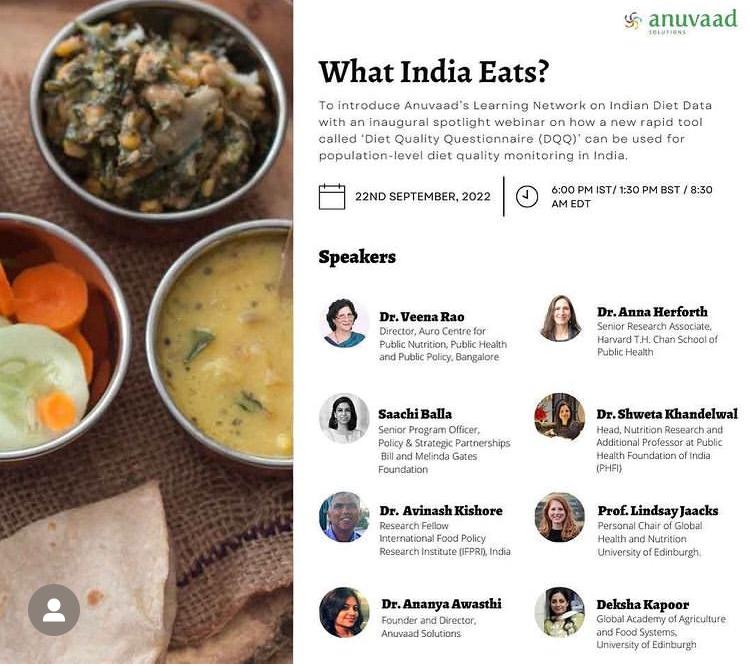What India Eats
Anuvaad Solutions hosted a webinar on ‘What India Eats’ on 22nd September 2022. The objective of the webinar was to introduce the audience to Anuvaad’s Learning Network on Indian Diet Data with an inaugural spotlight on the ‘Diet Quality Questionnaire (DQQ)’, a new tool that can be used for population-level diet quality monitoring. As part of knowledge translation efforts of Anuvaad, a fact sheet summarising results of the first DQQ assessment conducted in India was also shared during the webinar.
Access the full recording of the webinar here.

The opening remarks on the learning network were delivered by Dr. Ananya Awasthi, Founder & Director, Anuvaad Solutions. Dr. Awasthi shared that the aim of Anuvaad’s Learning Network is to provide a convening platform for lateral sharing of knowledge on Indian Diet Data between different development partners and academia, aimed at improving understanding and uptake of diet data by decision-makers to inform nutrition interventions.
Dr. Veena Rao, Director, Auro Centre for Public Nutrition, Bangalore and former Secretary to Government of India, quoted results from nutrition surveys conducted in India over the past nearly 100 years. Dr. Rao highlighted that Indians have been consuming diets that are high in carbohydrates, low in micronutrients and lack diet diversity for many years with little improvement. She noted that this dietary deficit is the root cause of undernutrition and micronutrient deficiency in India.
Dr. Anna Herforth, Senior Research Associate, Department of Global Health and Population, Harvard T.H. Chan School of Public Health, provided the audience a sneak peak of the results from the first national Diet Quality Questionnaire (DQQ) conducted in India. The DQQ is part of the Global Diet Quality Project. An English version of the Indian DQQ is freely available for use.
In India, the DQQ was collected via face-to-face interviews between July and October 2021 in a nationally representative sample of 3,000 respondents aged 15 years and older. It covered all states except Northeast and remote islands, and Jammu and Kashmir.
Access the English version of the Indian DQQ using the link here

Download the India Factsheet for the Diet Quality Profile using the link here.
Prof. Lindsay Jaacks, Personal Chair of Global Health and Nutrition at the University of Edinburgh & Academic Advisor to Anuvaad moderated a panel discussion.
Dr. Shweta Khandelwal, Head, Nutrition Research and Additional Professor, Public Health Foundation of India (PHFI), highlighted that there are gaps in diet data for some age groups, especially adolescents, and the importance of standardised tools for capturing diet data. Dr. Khandelwal shared that policymakers are now asking for diet data, and so it is promising that stakeholders are convening to understand what data are available and how to fill diet data gaps.
Dr. Avinash Kishore, Research Fellow, International Food Policy Research Institute (IFPRI), pointed out that the gap between common sources of proxy diet data such as FAOSTAT and consumption surveys is growing, and this has important implications for modelling studies. This point underscored the importance of having diet data in India. Dr. Kishore concluded by emphasising the importance of (1) collecting more diet data, (2) more frequently, (3) using smarter tools – not just door-to-door surveys. He noted that data on the cost of Indian diets are also required.
Ms. Deksha Kapoor from the Global Academy of Agriculture and Food Systems, University of Edinburgh, shared insights on the challenges of using new diet data collection tools like computerised 24-hour dietary recalls in the Indian context.
All panellists supported the initiative to create a Learning Network on Indian Diet Data and it was followed by a Live Q & A session. The way forward on the learning network was led by Ms. Saachi Bhalla, Senior Program Officer, Bill and Melinda Gates Foundation. Ms. Bhalla highlighted the role that such a learning network can play in promoting evidence informed nutrition interventions.
Join our Learning Network on Indian Diet Data by signing up here.


